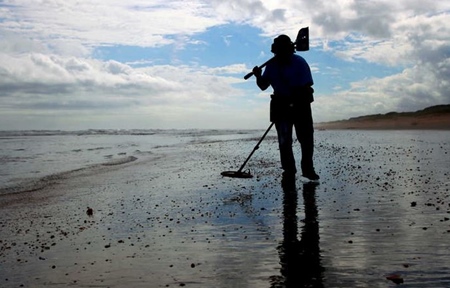Detectorists Do It for Fun and Profit
The term metal detector usually brings to mind an eccentric person slowly walking along a beach, swinging a weird looking stick. Searching the beaches for change and jewellery buried in the sand is indeed one of the uses of metal detectors. But there are many more!
Metal detectors are used in prospecting to find underground deposits of ore such as gold and silver. The waterproof varieties can help in underwater treasure hunting. In food processing, metal detectors reveal the possible contamination of the produce by metal shards from broken machinery.
In the clothing industry plants, the finished garments undergo metal detecting to check for broken needles and similar fragments. Metal detectors show the position of steel reinforcing bars, pipes and wires buried in walls and floors in the construction industry. They also detect land mines. Handheld or stationary walk-through metal detectors are widely used for security purposes, to discover concealed metal weapons on a person's body.
As a hobby accessible to the general public, metal detecting took off in the '60s, when the machines became lighter and easier to use. While some detectorists search beaches for lost objects such as R5 coins, watches, phones or gold rings, others specialise in rare coins, a hobby known as coin shooting, or amateur archaeology. Many historical artefacts around the world have been found by detectorists, but archaeologists often frown upon the practice, because amateurs may disrupt or destroy vital contextual evidence when unearthing their findings.

If you are planning to take up this engrossing hobby, it is important that you know the law. You must know whether you are permitted to hunt in a specific spot. You must also know what to do in case you discover treasures. Different places have different regulations!
Only then you should decide which metal detector to buy. There are many varieties to choose from, so in-depth research is necessary. Most modern metal detectors are easy to use and designed to be smart. They can use sound to tell you the difference between a good find such as a ring or a coin and junk such as iron or tin. They can also show you how deep your find is. Some metal detectors are so clever they can identify buried coins by size.
Your next step is to learn how to use your new instrument. The motto number one of detectorists is: low and slow. It means that you should keep the metal detector coil as close to the ground as possible without touching it and swing it slowly. If your detector coil is too far from the ground, it will miss objects buried deeper. If you swing too fast, it will miss smaller objects.
It is also important to have digging tools suitable for the terrain you are exploring, and to always cover up the holes you dug. Motto number two of detectorists is: leave that place as it was before you got there! Or make it better: true detectorists will pick up the trash their instrument reveals and dispose of it in a responsible manner.
Finding nothing but metal bottle caps or rusty nails can, of course, be dispiriting, but if you persevere you will probably be rewarded with some great finds.
And remember to take good care of your metal detector. It will function better and last longer if you treat it well.